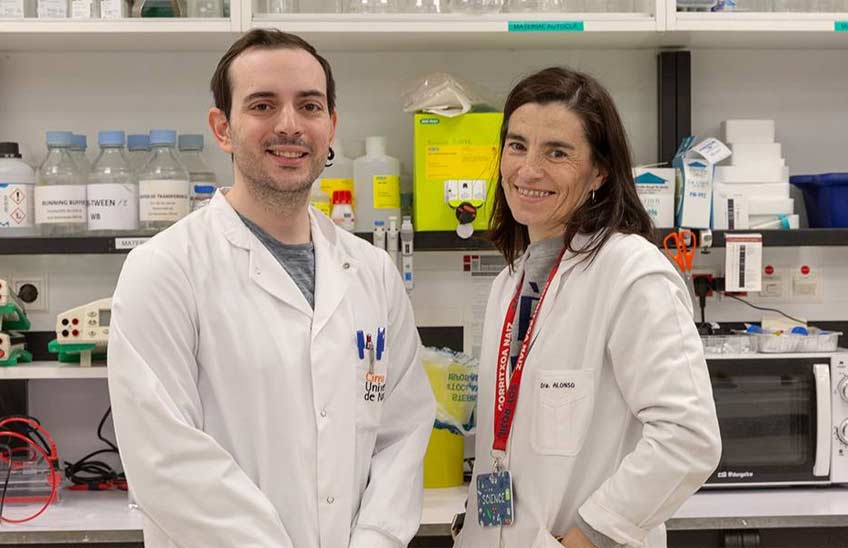Preclinical study improves treatment of the most aggressive pediatric brain tumors
Researchers at Cima University of Navarra have found that the combination of two known drugs opens the way to possible clinical trials to combat diffuse gliomas average and high-grade gliomas. Degree

FotoManuelCastells
/Daniel de la Nava, researcher predoctoral at Cima and Dr. Marta Alonso, director of the scientific study.
24 | 04 | 2024
Most childhood cancers affect children between 0 and 14 years of age and have the particularity -unlike in adults- of being tumors that cannot be prevented or detected beforehand.
A study developed at the Cima University of Navarra, and framed in the Cancer Center Clínica Universidad de Navarra, has found that the combination of two experimental drugs, Delta-24-RGD and ONC201, improves the treatment of the most aggressive pediatric brain tumors: such as pediatric high gliomas Degree (pHGG) and diffuse lineage gliomas average (DMG).
The research has worked with these two specific pharmacological compounds because they are the most advanced in their clinical development for this tumor subject . On the one hand, the virus that attacks cancer cells or oncolytic virus, Delta-24-RGD, yielded positive results in a essay clinical trial conducted at the Clínica Universidad de Navarra and, on the other, the drug ONC201 is at development in a phase 3 essay .
"In this study we have shown that the combination of both therapeutic strategies produces better responses in in vitro and in vivo disease models, enhancing an antitumor immune response," says Daniel de la Nava, researcher predoctoral at Cima and first author of the study.
The work, published in the journal Neuro-Oncology, finds that their administration together is more effective in destroying tumor cells than either of them alone. "Both retain their properties when administered andcause greater damage to the DNA of cancer cells, in addition to producing a change in the tumor microenvironment that drives an inflammatory reaction, typical of the activation of immune system cells," says Dr. Marta Alonso, director of the work and principal investigator of the group of Advanced Therapies for Pediatric Solid Tumors of the Cima.
"This co-treatment may be promising - as a pathway to research in future clinical trials - for pediatric patients with pediatric high Degree gliomas and diffuse lineage gliomas average regardless of tumor location or mutational status of the tumor," highlights first author Daniel de la Nava.
This research has been carried out by a team of scientists with public and private funding from the European Research Council, the Government of Navarra, the Ministry of Universities of the Government of Spain, the Instituto de Salud Carlos III and non-profit organizations such as ChadTough DIPG, association Española contra el Cáncer, Fundación LaCaixa/Caja Navarra, Fundación El Sueño de Vicky, Fundación ADEY, Fundación ACS, association Pablo Ugarte - Fuerza Julen, Fundación Hay que tomarse la vida con tumor, Fundación Blanca Morell, Fundación + research + Vida among others.
reference letter bibliographic
→ The oncolytic adenovirus Delta-24-RGD in combination with ONC201 induces a potent antitumor response in pediatric high-grade and diffuse midline glioma models. - Neuro-Oncology




